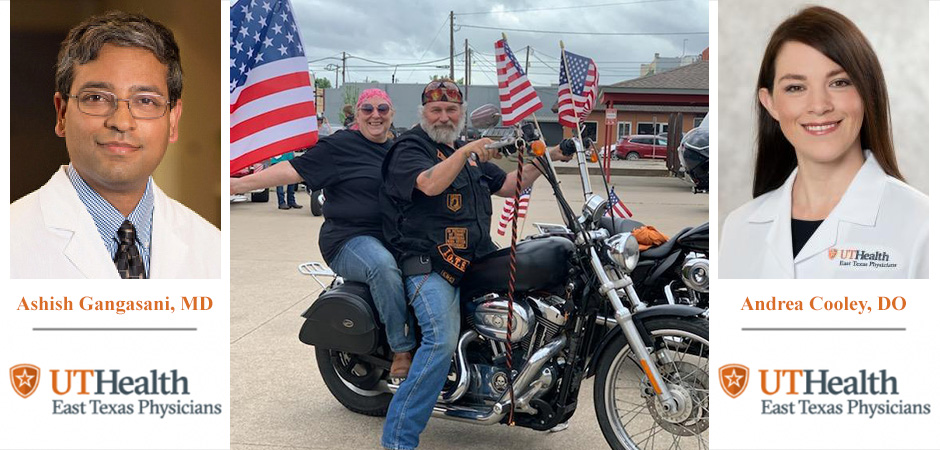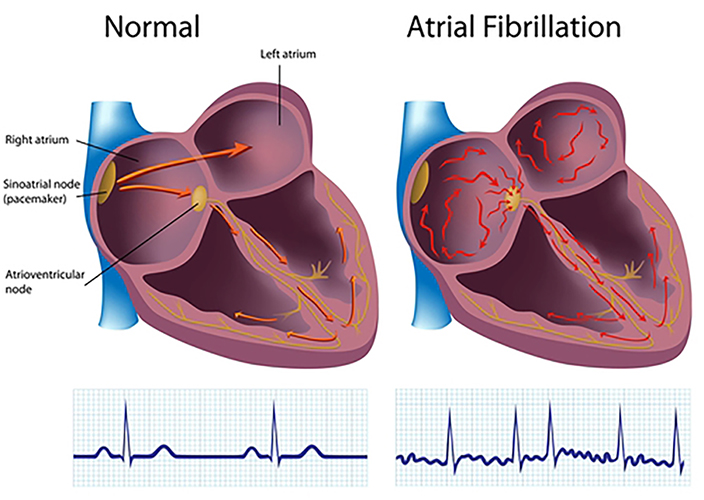
Cindy Hilliard, 64, doesn’t exactly remember when the irregular heartbeats started.
“It’s been about 5-6 years now, but I probably ignored them for quite some time before,” she said.
A truck driver who crisscrossed the U.S. for 18 years, Cindy enjoyed driving, especially on her favorite route. She would start at her home in Winnsboro, travel to Dallas, Los Angeles and Reading, Pennsylvania, before returning to Dallas and then back home – a journey over 5,800 miles that lasted 5 days.
“I never got to see many popular sites because of time constraints and because I couldn’t drive my truck around town, but the entire country sure is beautiful,” she said.
The long hours and long miles didn’t leave much time for exercise. “That was part of the problem, along with the amount of stress I was under during those years.” At the time, Cindy weighed 230 pounds and suffered from Type 2 diabetes and sleep apnea.
“I started having an irregular heartbeat – first fast, then slow. It was erratic. I was out of breath a lot and was so tired all the time,” Cindy said. “I could feel my irregular heartbeat as soon as it started,” she explained. “Eventually, it got to where it never stopped.”
Then 4 years ago, Cindy suffered a minor stroke. “That ended my cross-country truck driving career and changed my life.”
Atrial fibrillation
In addition to the minor stroke, Cindy was diagnosed with atrial fibrillation (also called AFib or AF).
According to the American Heart Association, AFib is a “quivering or irregular heartbeat (arrhythmia) that can lead to blood clots, stroke, heart failure and other heart-related complications.”
People with AFib can experience some of the following symptoms:- General fatigue
- Rapid and irregular heartbeat
- Fluttering or “thumping” in chest
- Dizziness
- Shortness of breath and anxiety
- Fatigue when exercising
- Sweating
- If you experience chest pain or pressure, you may be having a heart attack. Call 911 immediately.
There are a number of risk factors for developing atrial fibrillation. If you have any of the following conditions, especially the first 2, you have a higher risk for AFib:
- Advancing age
- High blood pressure
- Obesity
- European ancestry
- Diabetes
- Ischemic heart disease
- Hyperthyroidism
- Chronic kidney disease
- Heavy alcohol use
- Enlargement of the chambers on the left side of the heart
Types of ablations
To help fight Cindy’s AFib, she was referred to Dr. Ashish Gangasani, a cardiologist at the UT Health East Texas Heart and Vascular Institute. After examining Cindy and evaluating her condition, Dr. Gangasani recommended that she undergo a cardiac ablation.
An ablation either burns or freezes an area in the heart to turn the muscle into scar tissue. For someone with AFib, this stops the abnormal electrical signal from being able to trigger the irregular heartbeat.
There are different types of ablations, depending upon which area of the heart needs to be treated.
A catheter ablation uses a tube that travels through an artery in the leg to the inside of the heart to ablate the tissue. It is really successful in early forms of AFib because the abnormal electrical signal comes from a place in the heart the doctor can reach easily.
The convergent procedure combines a minimally-invasive surgery with a catheter ablation. This is for patients who have an advanced case of AFib. During AFib, the abnormal signal that causes the irregular heartbeat can move around the atrium (upper chambers of the heart). The convergent procedure allows the surgeon to work from the outside of the heart while the EP (electrophysiologist) can work inside of the heart. This allows the team to ablate more areas without having to do open-heart surgery.
A Maze ablation is an open-heart surgical procedure that first involves putting the patient on a heart-lung machine in order to stop the heart and perform the ablation. It is a highly successful but very invasive procedure. It is reserved for AFib patients who need open-heart surgery for other reasons, such a bypass to replace clogged arteries, valves, etc.
In Cindy’s case, Dr. Gangasani performed the catheter ablations while the Maze ablation was carried out by Dr. Andrea Cooley, a cardiothoracic surgeon at the UT Health East Texas Heart and Vascular Institute.
“Dr. Cooley was very good at explaining it all to me,” Cindy said. “She also recommended some YouTube videos where she explains how the Maze procedure works. I watched the videos and was pretty informed when I went in for the procedure. My God was there with me and I was not scared at all. I was confident it was going to be fine, and it was.”
By working as a team, the doctors combined the best technology from each specialty to provide a comprehensive, minimally-invasive treatment for AFib. Together they were able to ablate more areas of Cindy’s heart than either of them could have done alone. In essence, this combined approach produced the same outcomes of a big open-heart surgery by using a minimally-invasive approach.
“The procedures worked great; I haven’t had any irregular heartbeats since. I have more stamina and can breathe better. I think now it’s up to me to get myself in better shape,” said Cindy.
On the road again
With her health improving, things are looking up for Cindy, especially after getting married last year on July 4.
“My husband is in a motorcycle club, so we take trips on his bike with the club. Even though we are both in our mid-60s, we feel like newlyweds. The past few months have been wonderful. We are looking forward to taking more trips with the club, including a big campout in March.”
She attributes her improving health to the care of Drs. Gangasani and Cooley, along with the catheter and Maze ablations she received to stop her irregular heartbeats.
“If there is someone reading my story who is having as much trouble as I was, I would heartily recommend these doctors and the procedures,” Cindy said. “I want them to know that I'm very happy. It was well worth it.”
Visit our web page to learn more about the cardiac care services at the UT Health East Texas Heart and Vascular Institute or to schedule an appointment, or call us at (903) 596-DOCS.

